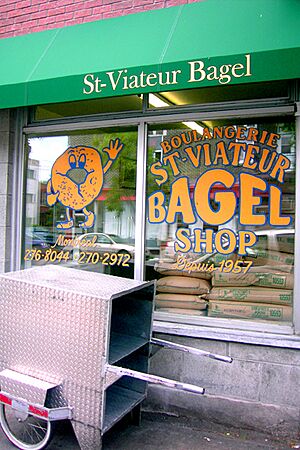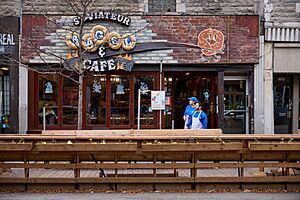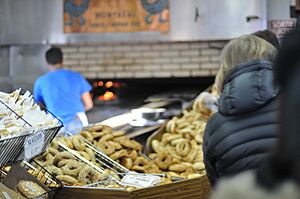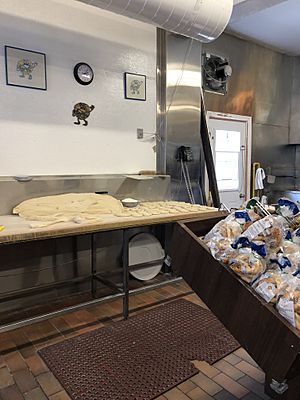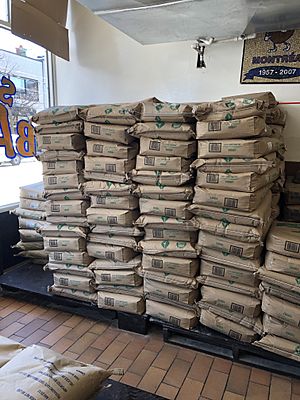St-Viateur Bagel facts for kids
St-Viateur Bagel is a famous bakery in Montreal, Quebec, Canada. It is known for its delicious Montreal-style bagels. The bakery is located in the Mile End neighborhood, which is part of the Le Plateau-Mont-Royal area.
Contents
The Story of St-Viateur Bagel
St-Viateur Bagel first opened its doors on May 21, 1957. It was started by Myer Lewkowicz, who had moved to Canada in 1953. Myer had a difficult childhood in Poland. He learned how to make bagels by working at another local bagel shop.
The bakery is named after St-Viateur Street, where it is located. It is one of Montreal's oldest bagel shops. In 1985, a big fire damaged the building. Luckily, the special wood oven used for baking stayed perfectly fine.
Today, Joe Morena owns the bakery. He worked there for 15 years before becoming the owner. St-Viateur Bagel has two main bakeries and three bagel cafés. They also have a food truck and an online store. In March 2019, one of their cafés on Monkland Avenue closed. This was because their lease ended and rent prices went up.
In 2017, St-Viateur Bagel celebrated a big milestone: its 60th anniversary!
Why Bagels Are Special in Montreal
St-Viateur Bagel Shop is located near Montreal's historic Jewish Quarter. This area is home to many famous food spots. These include Schwartz's deli and Moishes Steakhouse. These places have a long history with the Jewish community in Montreal.
Bagels and smoked meat became popular in Montreal a long time ago. This was because many Jewish immigrants settled along Boulevard St. Laurent. These foods were easy to find and not expensive.
Some people believe that the round shape of a bagel means infinity or forever. Because of this, bagels are often served at special family gatherings. They are part of celebrations for new babies and also at gatherings to remember loved ones.
How St-Viateur Bagels Are Made
The way St-Viateur Bagel makes its bagels has not changed since 1957. Each bagel is carefully rolled by hand. Then, it is boiled in water that has honey in it for about 30 to 60 seconds. After that, the bagels are dipped in seeds. Finally, they are baked on a long wooden plank in a special wood-burning oven.
Montreal bagels are different from New York-style bagels. Montreal bagels are usually sweeter and thinner. They also have a bigger hole in the middle. The wood-burning oven gives Montreal bagels their unique crispy outside.
Types of Bagels You Can Find
St-Viateur Bagel sells many kinds of Montreal-style bagels. Some popular choices include plain, sesame, and poppy seed bagels. They also offer "all dressed" bagels, whole wheat, and cinnamon & raisin. Other flavors are rosemary & sea salt, blueberry, pumpernickel, and muesli.
You can find information about what is in each bagel on their website. This includes details about ingredients and allergens. Each bagel has between 200 and 240 calories for two servings. If you want two dozen bagels, it usually costs between $22 and $25 Canadian dollars.
St-Viateur Bagel in the News
In March 2019, when the Monkland Village location closed, many news outlets in Montreal reported on it.
In 2018, there was news about wood-burning businesses. New rules meant they might have to switch to gas or electric ovens. This was to reduce air pollution. St-Viateur Bagel was mentioned as one of the shops that would be affected. Since then, St-Viateur Bagel has installed a special filter. This helps them reduce emissions and follow the local rules.
In 2020, St-Viateur Bagel was featured on a popular Netflix show called Somebody Feed Phil. It appeared in episode 5 of season 3.
See also
- Historic Jewish Quarter, Montreal
- Monkland Avenue, a street where a branch store was located
- Schwartz's
- Wilensky's
- Fairmount Bagel
 | Selma Burke |
 | Pauline Powell Burns |
 | Frederick J. Brown |
 | Robert Blackburn |


